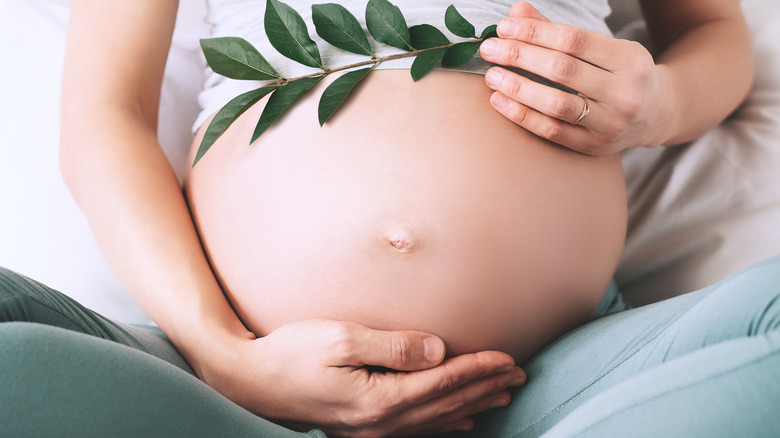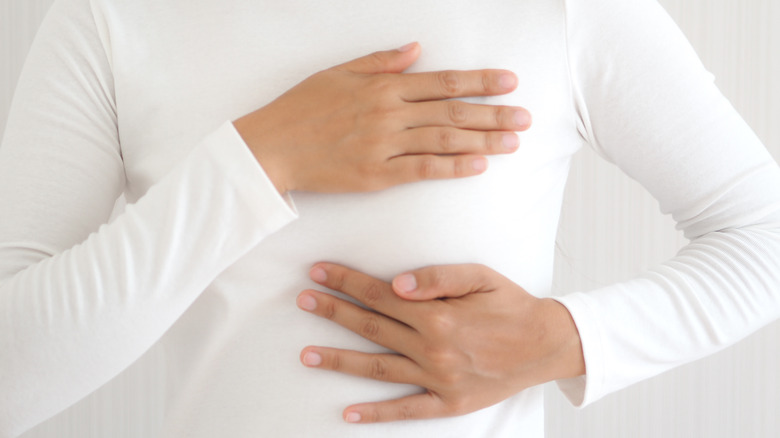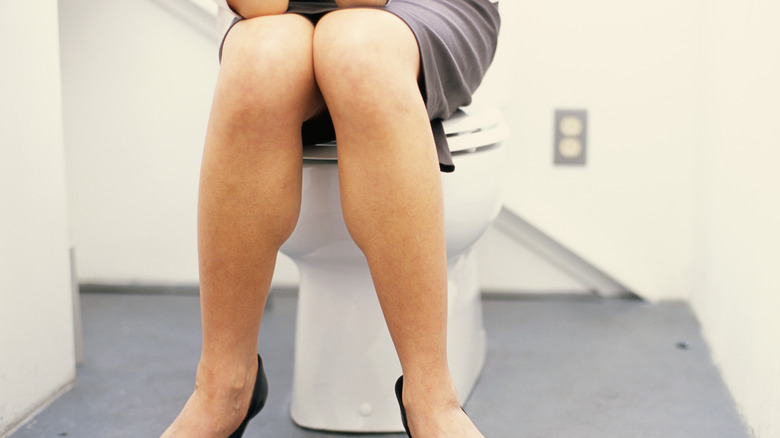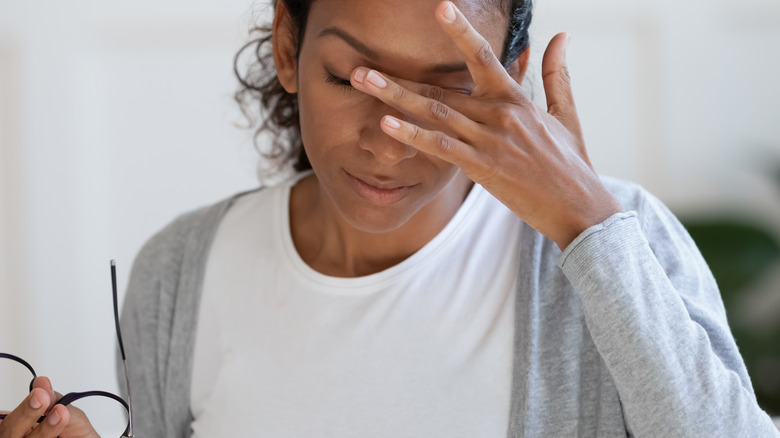How Your Body Changes During The Early Weeks Of Pregnancy
For many, becoming pregnant is the start of a brand new, exciting chapter in their lives. But the changes happening in the body once conception takes place can be quite scary and intimidating. Usually, the first telltale sign of pregnancy is a missed period; some people also experience a little bit of bleeding and even cramping, which is a result of the fertilized egg attaching itself to the uterus (via Family Doctor).
The first 12 weeks of pregnancy is referred to as the first trimester, and this is usually when you'll experience the most changes in your body, according to Healthline. The first 12 weeks of pregnancy are also the most crucial. This is when the fetus' vital organs start to develop. The first trimester is also the period during which you're at the highest risk of suffering a miscarriage.
According to Cleveland Clinic, most of the unpleasant symptoms women experience during the first few weeks of pregnancy is due to elevated levels of estrogen. Your body starts to produce more estrogen while you're pregnant than it otherwise would for the entirety of your life, so it's no wonder women experience roller-coaster emotions and significant physical changes. Read on for all the changes you can expect during the early weeks of pregnancy, what they mean, and how to navigate them.
You might experience nausea and vomiting
Dealing with nausea and vomiting is probably one of the most common changes associated with the early weeks of pregnancy. Often called morning sickness, this condition is not limited to mornings only, and you might feel sick at any time during the day — this is completely normal, according to the Mayo Clinic. You'll usually start to deal with this symptom one month into your pregnancy as your hormone levels become elevated. Johns Hopkins Medicine assures that morning sickness doesn't usually interfere with the nutrition of the mother or her unborn baby, and while that's good news, this still isn't a nice symptom to have.
If you do deal with morning sickness, there are some steps you can take to prevent or tone down your symptoms a bit. First of all, don't forget to eat (per the Mayo Clinic). This might seem counterintuitive, but having an empty stomach can actually trigger symptoms. Another way to combat nausea is by avoiding foods or smells that make you feel sick. Opting for foods that contain ginger might help ease your symptoms, as well as eating meals that aren't super high in fat. Staying hydrated is another way to keep morning sickness at bay.
Varicose veins might start to pop up
Varicose veins tend to make an appearance during the early weeks of pregnancy. This is due to increased blood volume. According to the Baby Center, your body starts to produce up to 50% more blood when you're pregnant. Naturally, this puts a lot of extra pressure on your veins, causing them to become bigger (via the Office on Women's Health).
The extra pressure the developing fetus puts on the veins found behind the uterus causes blood to move to your heart at a slower pace. Thanks to increased levels of progesterone, the muscles around your veins, called smooth muscles, start to relax. This is usually the reason why you'll notice varicose veins popping up on your legs. They most commonly make their appearance inside the leg or the calves. You'll recognize varicose veins by their blue color and bulging shape. If you have a family history of varicose veins, chances are you'll develop this condition during pregnancy, but around 30% of people who get pregnant for the first time still get varicose veins even if they are not genetically predisposed to it.
The good news is that there's a chance that varicose veins will disappear around 12 weeks after you delivered your baby. How much they fade depends on whether you had them before you got pregnant, whether you're genetically predisposed to the condition, your weight, how many pregnancies you've had, and whether you're required to stand for prolonged periods of time.
You might deal with constipation and hemorrhoids
Another not-so-great change that occurs in the body during pregnancy is the development of hemorrhoids and constipation. You can think of hemorrhoids as varicose veins that develop in the rectum, thanks to the extra blood your body produces and the pressure applied to your pelvis by your uterus. Hemorrhoids typically form in clusters that can bleed and be painful, especially while having a bowel movement (via Kids Health). It's also common to experience itching.
Pregnancy hormones affect the speed at which food moves through the gastrointestinal tract, which is usually the cause of constipation. Stanford Medicine recommends you make sure you drink enough water during the day (eight glasses should do the trick) and follow a diet that is rich in fiber. It's not advisable to take any laxatives for constipation without consulting your doctor first. Try changing your diet and keep tabs on your hydration before you opt for medication to provide relief. Working some exercise (like walking) into your daily routine can also help clear up constipation.
Constipation can cause hemorrhoids to develop or make existing hemorrhoids worse, so prevention is key. If this is something you continue to struggle with, ask your doctor about topical medications that you can apply to help shrink hemorrhoids. They can also prescribe a stool softener to help ease constipation.
You might experience indigestion
Gut issues are plenty when you're pregnant, and during those first few weeks, you might notice symptoms of indigestion and heartburn. Once again, fluctuating hormones and the pressure of the growing fetus are responsible. The valve that is located between the esophagus and the stomach will typically start to relax, giving acid from undigested food an open path to your esophagus, resulting in that uncomfortable burning sensation, according to the Office on Women's Health.
The muscles of the digestive tract are also affected by pregnancy hormones. They start to move at a slower pace, delaying digestion. In addition to the relaxed valve between the stomach and esophagus, these changes to the body create the perfect storm for heartburn and indigestion.
You can combat this pesky symptom by making sure you stay hydrated in between meals. Avoiding big meals can also help — it's recommended you eat various smaller meals during the day and avoid foods that are fried and greasy. Spicy foods can also contribute to heartburn and indigestion, as well as citrus fruits. To play it extra safe, don't lie down immediately after eating, and avoid drinking anything a few hours before you go to sleep at night. If none of these tips improve your symptoms, ask your doctor if they can prescribe you something to help ease the discomfort.
Feeling super tired is normal
One of the changes you'll likely notice during the early weeks of your pregnancy is a significant dip in your energy levels. Again, this is due to hormonal changes, Stanford Medicine reports. According to Family Doctor, fatigue might also be caused by all the physical changes your body endures during the first few weeks of pregnancy. "Your metabolic rate—the amount of energy you burn just to exist—is way above normal [during the first trimester of pregnancy]," Kane Low, M.D., told Parents. He adds that the emotional toll the new pregnancy takes on women also has an impact.
According to Kids Health, a lack of concentration alongside tiredness is also very common. Even if you're getting enough sleep, you might still notice that you're forgetful and struggle to focus on one thing at a time. This is normal, and you'll usually notice that your energy levels start to pick up again once the first trimester ends.
It's important to listen to your body during this time. When you feel tired, allow yourself to take a nap, and eat a healthy diet that promotes energy. Incorporating some gentle exercise into your routine can also help to give your body an energy boost. Check with your doctor to ensure your exercise of choice is safe to do during pregnancy. Even if you're not allowed to do specific types of exercise, something as simple as a quick walk can also do wonders for your energy levels.
You might have spotting and discharge
When you notice some spotting or discharge during the early weeks of your pregnancy, it's normal to be alarmed, but this is usually nothing to worry about.
According to the National Health Service (NHS), light bleeding or spotting occurs when the embryo attaches itself to the womb. This is a natural process, and you'll likely notice this occurring during the time you'd usually have your period. Some women also experience changes to their cervix while they are pregnant, which can lead to bleeding. This usually occurs after having sex, and is also considered a normal occurrence. In some cases, spotting or bleeding can signal that you have an ectopic pregnancy or that you're about to have a miscarriage, but bleeding during the first few weeks is typically nothing to be alarmed about. Family Doctor advises that you contact your doctor if you notice any bleeding, and if you experience pain alongside very heavy bleeding, you need to go to the emergency room ASAP.
Noticing a thin white vaginal discharge is also normal, according to Medical News Today. This discharge is called leukorrhea, and it's triggered by high levels of estrogen. You might notice a lot of discharge; this is because there is an influx of blood flow to the vagina and uterus. This discharge works to protect the uterus by cleaning out any potential vaginal infections.
Your breasts and skin will start to change
A lot of changes take place inside the body during the early weeks of pregnancy, but you'll also notice changes occurring to your skin and your breasts.
Thanks to the extra blood your body produces during pregnancy, your oil glands will start to release more sebum, which can lead to acne breakouts (via Kids Health). You might also notice some hyperpigmentation developing on your skin, thanks to pregnancy hormones triggering the body's pigment production. This pigmentation often occurs around the genitalia, nipples, and anus. You might also develop brown or yellow patches on your face, known as chloasma. Preventing this condition is nearly impossible, but avoiding direct sunlight and applying sunscreen daily can help tone down the severity.
Women also typically start to notice their breasts changing during the early days of their pregnancy. Hormones are once again the driving force behind these changes, according to Family Doctor. Your body is getting ready to produce breast milk for your unborn baby, and this results in sore breasts that are often accompanied by some swelling. The size of your breasts will continue to increase as your pregnancy progresses. You might also notice changes to your nipples — it's common for small, white-colored bumps to form on the skin during this time as sweat glands enlarge, according to Johns Hopkins Medicine.
Mood swings are part of the package
Emotional changes are incredibly common during the early weeks of pregnancy, and you might find that your moods fluctuate like crazy.
According to the American Pregnancy Association, mood swings are typically the result of hormonal changes specifically related to progesterone and estrogen. As hormone levels fluctuate, your brain's neurotransmitters are affected. These brain chemicals are responsible for keeping your moods in check, so to speak, but depending on how much pregnancy hormones affect them, you'll experience sudden changes in your mood. It's also common for the body's metabolism to undergo some changes, which can also cause moods to fluctuate. Stress can also have an impact.
Healthline recommends you eat a healthy diet and take care not to get too hungry. This will keep your energy levels up and keep sudden mood swings at bay. Making sure you sleep enough is also crucial. If you're rested, chances are you'll be less likely to contemplate punching someone in the face later in the day. Exercise is another great way to nip mood swings in the bud. The release of those feel-good endorphins is bound to chase away any thunderclouds hanging over your head. If you're feeling incredibly anxious about your mood swings and feel like they're getting the best of you, consider talking to a therapist. They can offer guidance on how to cope with your emotions and moods during your pregnancy.
You might need to urinate more often than usual
Pregnancy brings with it a ton of surprises, one of which is that you'll have to make way more trips to the bathroom than you're used to. According to Johns Hopkins Medicine, frequent urination is the result of the uterus' weight putting pressure on the bladder.
Aside from having to urinate way more than you'd like, you might also notice that you can't control your bladder like you used to (another reason to make frequent trips to the bathroom). Aside from your bladder, the pelvic floor muscles and urethra are all subjected to extra pressure from the fetus. You might find that you're not able to control your bladder function adequately when you laugh, sneeze, or cough. While leakage really isn't a fun change to deal with, it's normal to experience it during pregnancy, the Office on Women's Health assures.
If leakage is a concern, there are some things you can do to prevent it, like making sure you go to the bathroom when nature calls instead of putting it off. Preventing dehydration by drinking enough fluids can also help. If you like to go the extra mile, you can work some kegel exercises into your routine to help strengthen your pelvic floor muscles.
Again, frequent urination and leakage aren't anything to worry about, but if you experience a burning sensation when you urinate, you should speak to your doctor since this can be a sign of infection.
It's normal for your heart rate to be elevated
Pregnancy affects the body in a myriad of ways, so it's no surprise that it also has an impact on your heart. If you wear a fitness tracker or smartwatch and notice that your heart rate is slightly elevated, there's nothing to be alarmed about. Your body produces more blood during pregnancy; it's only natural, then, for the heart to work a little harder to circulate all that extra blood through your body (via Mayo Clinic).
According to Medical News Today, some people's increased heart rate during the early weeks of pregnancy is due to anxiety. If you're someone who gets anxious when your heart beats too fast, you might experience additional anxiety, which will only result in an even higher heart rate. Knowing that an elevated heart rate during pregnancy is normal can help ease any anxiety you feel, but if you find that you constantly feel anxious, it's wise to speak to a therapist or your doctor so they can help you manage it.
You can expect to deal with food cravings
Cravings are, of course, also a result of hormonal changes, but they might also be influenced by existing nutritional deficiencies. Women's sense of taste and smell become more sensitive during pregnancy, which can have an impact on the foods they crave, according to Intermountain Health Care.
Healthline explains that doctors still aren't 100% sure why women experience certain cravings during pregnancy. They speculate that people are drawn to certain foods because it brings them comfort during all the changes pregnancy brings about. Another theory is that the sudden changes in the body are what trigger cravings. On the flip side, you might also start to find foods that you previously enjoyed repulsive. "Your digestion is slowing down, so some formerly appealing foods become intolerable," certified nurse-midwife Lisa Kane Low, Ph.D., R.N., told Parents. She adds that you should not try to eat something you find repulsive just because you know it's nutritious — you'll only make yourself feel worse.
Meat is a common aversion during pregnancy, according to a 2006 study published in Proceedings of the Royal Society B: Biological Sciences. A 2011 study published in Ecology of Food and Nutrition (via Healthline) suggests that this might be because the body sees the bacteria found in meat as a threat to the mother and unborn baby. In order to protect both, the body reacts negatively to meat. This might be true for other foods women find unappetizing during pregnancy.
Your weight will fluctuate
One of the inevitable changes you will experience during the first trimester is weight gain. According to Parents, women typically gain around 5 pounds during the first trimester. This is supposed to happen, so don't panic. Some women initially lose some weight because of morning sickness. This isn't something to worry about, as long as you do gain some weight as your first trimester progresses. All in all, you'll gain around 22-28 pounds during your pregnancy, the NHS reports. Some of the weight you gain is made up of fat, while the rest can be attributed to your growing baby.
The reason your body will put on extra weight is to ensure you have enough reserves to produce breast milk once your baby arrives. While putting on weight can feel scary, it's important to remember that it's vital for your health and your unborn baby's. You should under no circumstances consider going on a diet to keep the weight off. "Anytime you deprive your body of the nutrients it needs, it has to rob them from someplace else," certified nurse-midwife Lisa Kane Low Ph.D., R.N., told Parents, adding that your body usually taps into your iron and calcium reserves as a result. The NHS also warns that not gaining enough weight can lead to complications for both the mother and her baby. The same applies if you gain too much weight. This is why sticking to a healthy, nutritious diet is incredibly important while you're pregnant.
You might feel dizzy or lightheaded at times
In those early weeks of pregnancy, your body is working hard to ensure the fetus grows and develops as it should. This includes the development of extra blood vessels and producing more blood to support the growing fetus. All these changes put a lot of extra stress on your body, which can result in feeling light-headed or dizzy, according to the Office on Women's Health. Family Doctor warns that stress and an empty stomach can also contribute to dizzy spells. In some cases, the extra pressure the uterus puts on blood vessels can also cause these symptoms. Fainting isn't common, but it can happen.
In order to prevent all these bodily changes from getting the best of you, the Office on Women's Health recommends you eat regular meals, refrain from standing for prolonged periods of time, and stand up slowly when you've been sitting or lying down. Steering clear of super tight clothes can also help ease symptoms, as well as lying down on your left side. If you ever experience dizzy spells alongside abdominal pain or vaginal bleeding, contact your doctor immediately.














